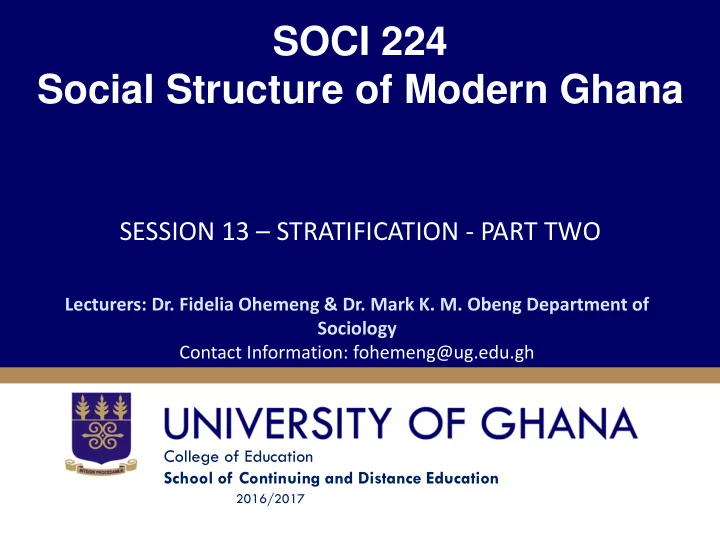

SOCI 224 Social Structure of Modern Ghana SESSION 13 – STRATIFICATION - PART TWO Lecturers: Dr. Fidelia Ohemeng & Dr. Mark K. M. Obeng Department of Sociology Contact Information: fohemeng@ug.edu.gh College of Education School of Continuing and Distance Education 2016/2017
Session Overview This session is a continuation of Session 12. In this session we explain how some sociological theories such as functionalism and Marxism explain stratification. The task of the student after this session is to apply these theories to explain stratification in the Ghanaian society. Slide 2
Session Outline The key areas to be covered in this session are as follows: • Sociological perspectives on stratification • How does these perspectives apply to the Ghanaian society • Contribute to the debate as to whether there is a system of social class in Ghana Slide 3
Reading List • Nukunya, G. (2014). Tradition and Change in Ghana: an Introduction to Sociology . Accra: Ghana Universities Press. Chapter 10 Slide 4
Theoretical Perspectives: Functionalism • Talcott Parsons- key proponent, was influenced by Durkheim, Weber. Popular in 1900s • Functionalism sees society as a system of highly interrelated parts that work together harmoniously • The image that functionalists use to understand society is a living organism • Each part of society works together for the benefit of the whole much like a living organism
FUNCTIONALISM • Parts of system that fails to make contribution to the maintenance of a system will not be passed down to another generation – Merton (1968): Manifest & Latent functions • Dysfunction : an element or a process of society that may actually disrupt a social system or lead to a decrease in stability Slide 6
Functionalist view on Social Stratification 1. That in every society some positions are considered more important than others because these positions require people with some special skills 2. People with the requisite talents are scarce 3. The period for the training is long and requires that while under training the people must forgo some gratifications 4. Due to the factors above the remuneration must be high to Thus, according to functionalist theory, positions with the highest rewards are those with the greatest functional importance. Slide 7
Functionalist Applicability to Ghana • The functionalist theory is applicable both to traditional and modern societies. • In traditional societies, some people are designated as chiefs, linguists, priests, royals and commoners based on the functions each performs in the society. • In the modernising Ghanaian society there is evidence of differentiated durations in training. Medical doctors spend more years in training than nurses or teachers and so receive more remuneration than them. Slide 8
Conflict Theory • Conflict theory is grounded in the work of Karl Marx – But expanded beyond Marx’s class phenomenon • Society is understood to be made up of conflicting interest groups who vie for power and privilege • This dynamic results in continuous social change, which is the normal state of affairs • Conflict theory focuses heavily on inequality and differential distribution of power and wealth
Conflict View on Social Stratification • According to Marx, social classes developed on the basis of the different positions or roles, which they perform in the production process in the society. • The class he identified are: – the bourgeois: the capitalist or owners of the means of production – proletariat: the workers or those who sell their labour – The petite bourgeois: the merchants and self employed Slide 10
Conflict perspective’s applicability to Ghana • How applicable is the Marxist class system applicable to the Ghanaian society? • According to Ansah Asamoa (2007) the bourgeois in Ghana are those in the corporate world. They can be divided into three categories. They are: – Comprador bourgeois. These are Ghanaian nationals who have teamed up with foreign companies – National bourgeois. These are Ghanaian entrepreneurs who are independent of foreign capital – Rural bourgeois. Constituted by rich farmers who employ wage labourers to work on their farms or plantations. Slide 11
Max Weber • Weber postulated that stratification based on class, status and power – Class-people who share similar interests and income – Status-people with the same prestige and lifestyle. An individual gains status through membership in a desirable group – Power-ability to gain influence over others.
Weber’s applicability to Ghana • All three of Weber’s classes can be identified in Ghana • Class: business owners can be classified as a class or CEO’s of big companies. Why? Because they have similar economic income and interests. Can you mention some names? • Status: people who share the same esteem and prestige. Example, lawyers, doctors, bankers, etc. • Power: people who the ability to influence others. Example, politicians, religious leaders, celebrities, judiciary, etc. Slide 13
Question for discussion • How does any one of the reviewed sociological perspectives helps you to understand the pervasiveness of social inequality in your community? Slide 14
Recommend
More recommend